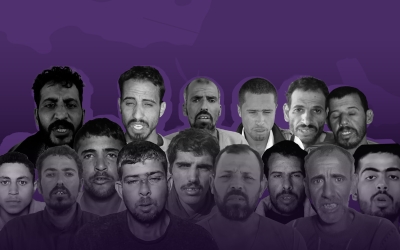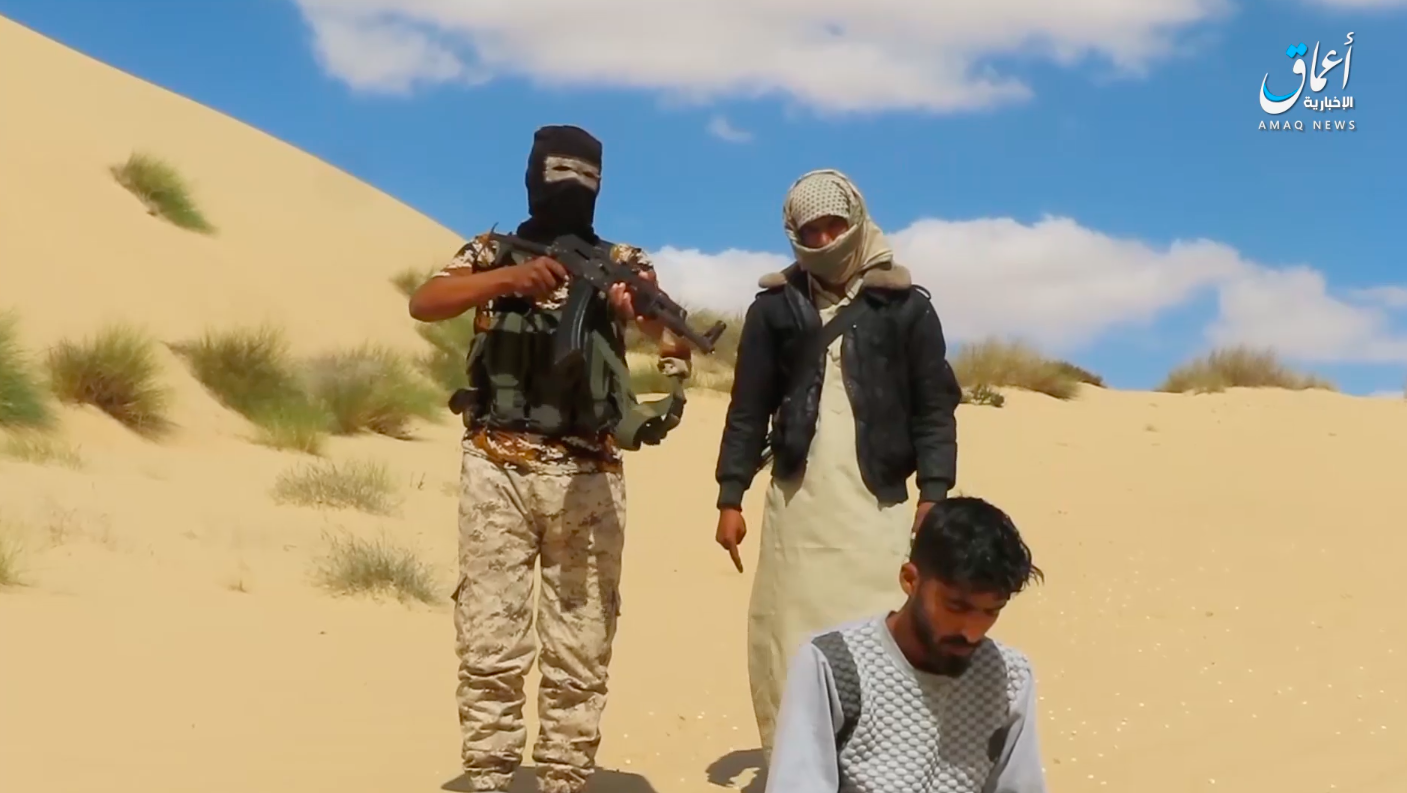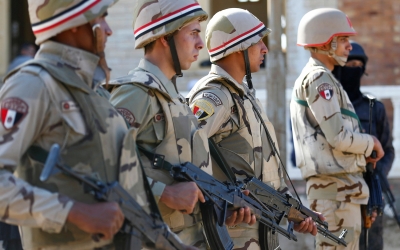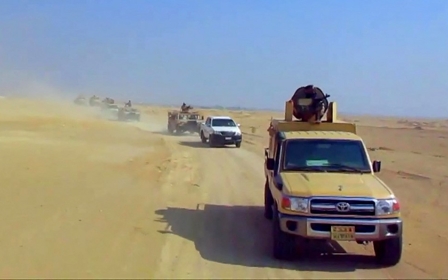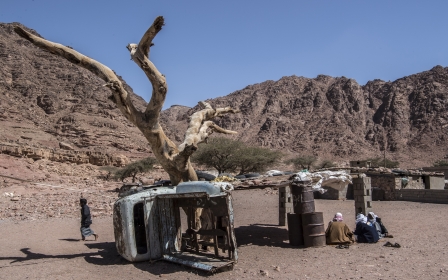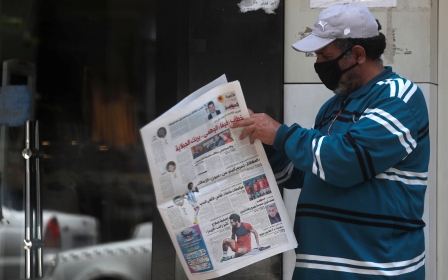Egypt: IS executes two civilians for collaborating with military in North Sinai
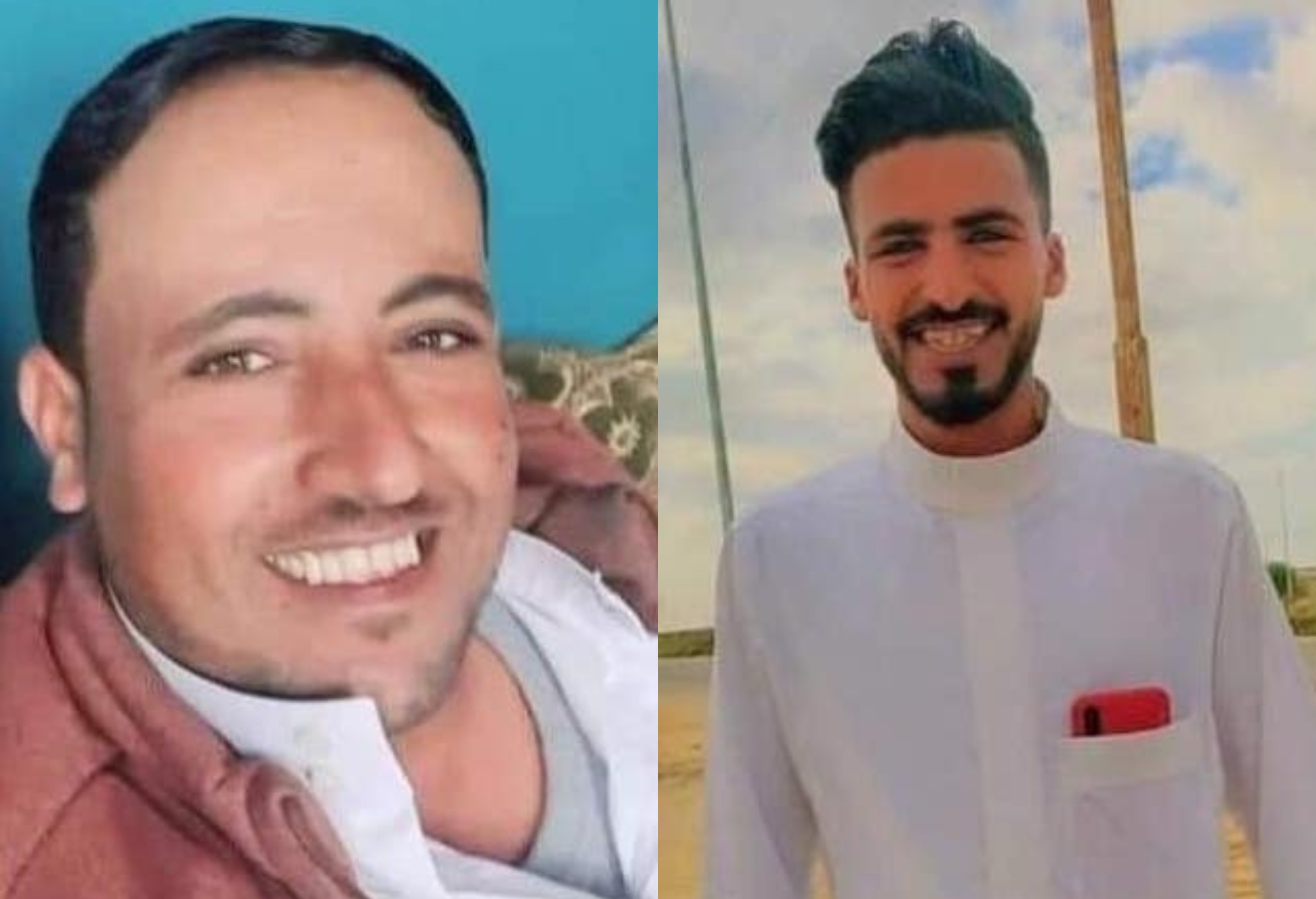
Two Bedouin tribesmen from North Sinai have been executed by Islamic State fighters after being accused of collaborating with the military, in the latest series of retaliations by the group against civilian confidential informants, local sources told Middle East Eye on Monday.
Last week, MEE reported the kidnapping of 14 men from Al-Dawaghra tribe, known for its close ties with security forces in North Sinai. According to tribal sources, 12 were released on Thursday, while Mohamed Ibrahim Hamdan, 23, and Swilam Ahmed Swilam, 44, were killed by Islamic State fighters.
Both men are fish vendors in the local market in Bir al-Abd. The 12 released men were interrogated and let go with a warning not to collaborate or work for the military or the Egyptian government.
On Saturday, a video was published on a Telegram channel affiliated with IS, titled “The Neutralisation of Two Spies for the Egyptian Army”. The video shows Hamdan and Swilam confessing to their recruitment by the Egyptian armed forces as informants, before being executed by gunfire.
In the video, Swilam can be heard saying that he was a guide who worked with a military intelligence major named Gaber who instructed him to report the movements of IS fighters. “In one incident, the army waited and ambushed the soldiers of the Islamic State. Three of them [IS members] were killed.”
Swilam also said he drove officers going on vacations back and forth from and to Sinai. It is not clear how Hamdan collaborated with the military.
In the video Swilam can be seen digging his grave in an unknown location. Above him an Islamic State fighter can be seen, and is heard saying “Today we avenge the blood of our jihadi brothers who were killed due to the actions of this spy for over a year.”
'The worst that we feared has happened,'
- Maghnam, member of the Dawaghra tribe, North Sinai
IS does not only target informants working with the security services, but also workers, drivers and vendors who do services with the government.
“This is for the spies and al-Sahawat [pro-military militias]. They should know that we are ready for them…and we are going to, God willing, hunt them down in their homes. We have warned them many times, but they do not repent," the Islamic State fighter said before shooting Swilam in the back.
Al-Sahawat, the Awakening, is a term used by Sunni Islamist militants to refer to pro-government militias. It wasn used during the Iraq war to refer to tribes and militiamen who took arms against militant groups in Al-Anbar, Iraq, after receiving support from the Americans. In North Sinai, it is used to refer to the pro-military tribes and militias, primarily the Union of Sinai Tribes.
The video also shows an Islamic State fighter shouting “this is the fate of apostates”, before shooting Hamdan who was seen sitting on the ground handcuffed.
'Martyrs of the nation'
The video shocked the Dawaghra tribe, who have been awaiting any news about their kidnapped relatives.
The Dawaghra is one of several North Sinai tribes that has been assisting the military and police forces in the restive peninsula since 2014.
Several tribes in Sinai have issued condolences and condemnation statements, describing Hamdan and Swilam as “martyrs of the nation”.
Maghnam, a member of the tribe, told MEE that his village has been in mourning ever since they heard the news. “We hoped that they would be released along with the others.
“We were not able to sleep since we saw the news. The worst that we feared has happened,” he added.
The tribe is devastated, as the bodies of the two men were buried in unknown locations.
“We didn’t even get to pay respect to them,” said one tribesman.
Maghnam asserts that they have not received any communication from the military and were only contacted by members of the Union of Sinai Tribes. “The tribe’s elders said we will not accept condolences until retribution happens, but they said that before,” he added.
In March 2020, militants also executed two men from Dawaghra for collaborating with the military.
Amid silence from official institutions and Egyptian media, the Union of Sinai Tribes described the killings in a statement as “another crime by the takfiri elements in a staged scene under the threat of weapons accusing them [Hamdan and Swilam] of collaborating with the army and police.”
The union, which is a vocal supporter of the military and the militia wing of the Egyptian state in North Sinai, accused human rights organisations of failing to report the killings of hundreds of civilians by IS affiliates.
In an effort to combat Islamic State, Egyptian security forces have resorted to the help of local tribes, either as confidential informants (CIs) or as paramilitaries.
Like many incidents and details about Egypt's war against Islamic State fighters in North Sinai, little has been written or reported about this collaboration, aside from hyper-nationalist articles celebrating an undefined role of the tribes in the counterinsurgency.
But since 2013, after the intensification of the insurgency following the violent dispersal of the Rabaa Adawiya sit-in, male members of the tribal community who, voluntarily or under pressure, collaborated with the military to counter Islamic State fighters say they have been left alone to face the backlash.
Many have been executed - their bodies often decapitated - or kidnapped by the Islamic State, with almost no mention in the local papers or military statements, and with no recognition or honouring of them to their families.
This article is available on Middle East Eye French edition.
Middle East Eye propose une couverture et une analyse indépendantes et incomparables du Moyen-Orient, de l’Afrique du Nord et d’autres régions du monde. Pour en savoir plus sur la reprise de ce contenu et les frais qui s’appliquent, veuillez remplir ce formulaire [en anglais]. Pour en savoir plus sur MEE, cliquez ici [en anglais].


